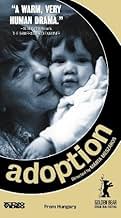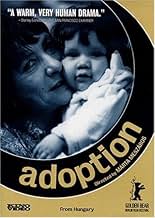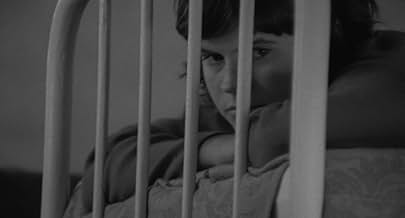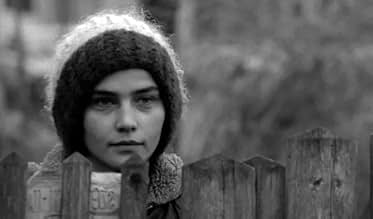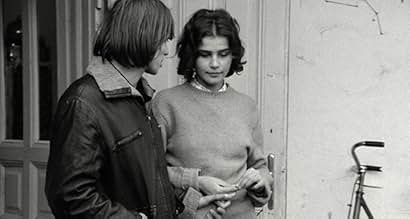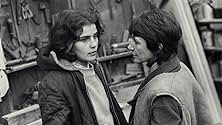IMDb RATING
7.2/10
1.6K
YOUR RATING
A lonely middle-aged woman wants to give birth to a child, but her acquaintance with dysfunctional teenagers leads her to the idea of adoption.A lonely middle-aged woman wants to give birth to a child, but her acquaintance with dysfunctional teenagers leads her to the idea of adoption.A lonely middle-aged woman wants to give birth to a child, but her acquaintance with dysfunctional teenagers leads her to the idea of adoption.
- Director
- Writers
- Stars
- Awards
- 4 wins & 1 nomination total
Katalin Berek
- Csentesné - Kata
- (as Berek Kati)
János Boros
- Anna apja
- (as Boross János)
Árpád Perlaky
- Orvos
- (as Dr. Perlaky Árpád)
- Director
- Writers
- All cast & crew
- Production, box office & more at IMDbPro
Featured reviews
Katalin Berek has a checkup She's 42 and wants to see if she can have a child. She wants one, but her lover doesn't. He is a married man, and they understand he's not going to leave his family. Miss Berek is trying to write a letter apologizing for upsetting him when Gyöngyvér Vigh walks into her life. Miss Vigh has her own letter, this one to her mother saying she's been neglected, and she is going off to lead her own life. Then, while she's putting her own life in order, she stays with Miss Berek.
Márta Mészáros's movie about what defines family is neither subtle nor deep, but watching Miss Berek figure it out on her own is rather interesting, and reasonably paced; I never grew impatient with her not getting it sooner. Even the 1970s depression that hangs over this movie and never quite lifts seems appropriate.
Márta Mészáros's movie about what defines family is neither subtle nor deep, but watching Miss Berek figure it out on her own is rather interesting, and reasonably paced; I never grew impatient with her not getting it sooner. Even the 1970s depression that hangs over this movie and never quite lifts seems appropriate.
Marta Meszaros was born in 1931 and still making films having made about thirty and shorts and TV also previously married to Miklos Jancso. Mostly known for Diary For My Children (1984) and recently Aurora Borealis: Northern Light (2017) and Adoption made earlier with an award at Berlin. The film is rather sad with the woman in her 40s and really wanting to have a baby but her lover not happy as he already has a wife and children. A young dysfunctional girl, she thinks, it might be an idea, although it is rather silly and it becomes complicated she is already unhappy with her life and her parents. The end is very sudden as she runs for a bus, although it doesn't look like being a good outcome. Nevertheless I thought it was well done and especially of the young girl and the older woman, and of course everyone at the wedding.
10vincentw
As austere as any Bresson, this film shows Meszaros' brilliance as a filmmaker. The story is simple, the acting understated and powerful, the black and white photography masterful, the atmosphere strained and grey. Without once mentioning politics, it could not be a more powerful indictment of Communist society.
It is, a sad comment on the state of film distribution in this day and age that the works of Meszaros, the most prolific woman filmmaker of all time, should be so little available. Come on, Amazon, get with it!
It is, a sad comment on the state of film distribution in this day and age that the works of Meszaros, the most prolific woman filmmaker of all time, should be so little available. Come on, Amazon, get with it!
A single woman turned 40 wants a baby but has nobody to give her one. Her instincts displaced, she befriends a tearaway girl from a young offender's institution. The two women, each at a watershed in their lives, draw something from each other without being able to relate to each other properly.
It has an ungainly, unstructured feel to it more sentiment than substance - like a day imperfectly remembered, which amounts to a startling, artless realism. The smudgy black and white Hungarian landscape and sparse dialogue are forefunners of Tarr's, and there are some nicely observed characters. Women will connect with Meszaros' worldview: life as a forlorn struggle to be as benign as one might want to be, but inevitably held back by the sheer dourness of the world. So we make do with what we have and hope that things occasionally work out, as they do here. Winner of the Golden Bear.
It has an ungainly, unstructured feel to it more sentiment than substance - like a day imperfectly remembered, which amounts to a startling, artless realism. The smudgy black and white Hungarian landscape and sparse dialogue are forefunners of Tarr's, and there are some nicely observed characters. Women will connect with Meszaros' worldview: life as a forlorn struggle to be as benign as one might want to be, but inevitably held back by the sheer dourness of the world. So we make do with what we have and hope that things occasionally work out, as they do here. Winner of the Golden Bear.
Marta Meszaros brings a subtle, yet effective critique of both communist Hungary and the patriarchal system that existed there in the mid 1970s. This film does move slowly, but that is part of what makes it great. It is shot in the social realism style. This means that there are long drawn-out shots, often with little dialogue. Slow camera movements are also a hallmark of this style. Since Adoption was made well outside of the Hollywood system, it does not adhere to the conventions that many American moviegoers would expect. If action-adventure is your kind of movie, skip this one. If, however, you are intrigued by a well told story pertaining to everyday life, this film is worth checking out.
Did you know
- TriviaIncluded in the Criterion Collection, Spine #1115.
- ConnectionsFeatured in Women Make Film: A New Road Movie Through Cinema (2018)
- How long is Adoption?Powered by Alexa
Details
- Runtime
- 1h 29m(89 min)
- Color
- Sound mix
- Aspect ratio
- 1.85 : 1
Contribute to this page
Suggest an edit or add missing content


